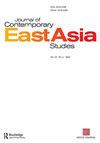IF 1.4
Q1 AREA STUDIES
引用次数: 5
摘要
Xi就职后,倡导实现“中华民族伟大复兴”的“中国梦”口号,推行扩大“核心利益”的政策,引发了党和社会日益高涨的民族主义情绪,增强了对Xi的支持。中国在东海和南海主张领土主权和海洋利益的强硬行为导致了与该地区国家的紧张关系,但Xi利用与邻国的冲突关系加强了他在中国政治中的领导地位。Xi政府实现了四个海上执法机构并入中国海警,并成立了中央国家安全委员会,这需要克服党内的顽固反对。Xi还将“中国特色大国外交”作为中国外交政策的新方向,寻求中国在国际社会中的更大领导地位,这有助于Xi巩固政治权威。Xi巧妙地运用了强硬的外交手段来提高他在中国政治中的权威。本文章由计算机程序翻译,如有差异,请以英文原文为准。
Xi Jinping’s diplomacy and the rise of his political authority
ABSTRACT Xi Jinping’s political authority was not preeminent among cadres of the Communist Party of China when he assumed the General Secretary of the Central Committee in November 2012. After his inauguration, Xi advocated a slogan of “Chinese Dream” for realizing the “great rejuvenation of the Chinese nation” and pursued the policies for expanding the “core interests,” which appealed to growing nationalism among the party and the society, resulting in enhancing their support to Xi. China’s assertive behavior to claim territorial sovereignty and maritime interests in the East and South China Seas caused tension with the regional countries, but Xi took advantage of the conflictive relations with neighbors to strengthen his leadership in the Chinese politics. Xi administration achieved the integration of four maritime law enforcement agencies into the China Coast Guard and the establishment of the Central National Security Commission, which needed to overcome persistent opposition within the party. Xi also launched “Major Country Diplomacy with Chinese Characteristics” as a new direction of Chinese foreign policies, seeking for greater leadership of China as a major power in the international community, which helped Xi to consolidate political authority. Xi cleverly employed assertive diplomacy to raise his authority in the Chinese politics.
求助全文
通过发布文献求助,成功后即可免费获取论文全文。
去求助
来源期刊

Journal of Contemporary East Asia Studies
Social Sciences-Cultural Studies
CiteScore
2.50
自引率
0.00%
发文量
10
审稿时长
6 weeks
 求助内容:
求助内容: 应助结果提醒方式:
应助结果提醒方式:


